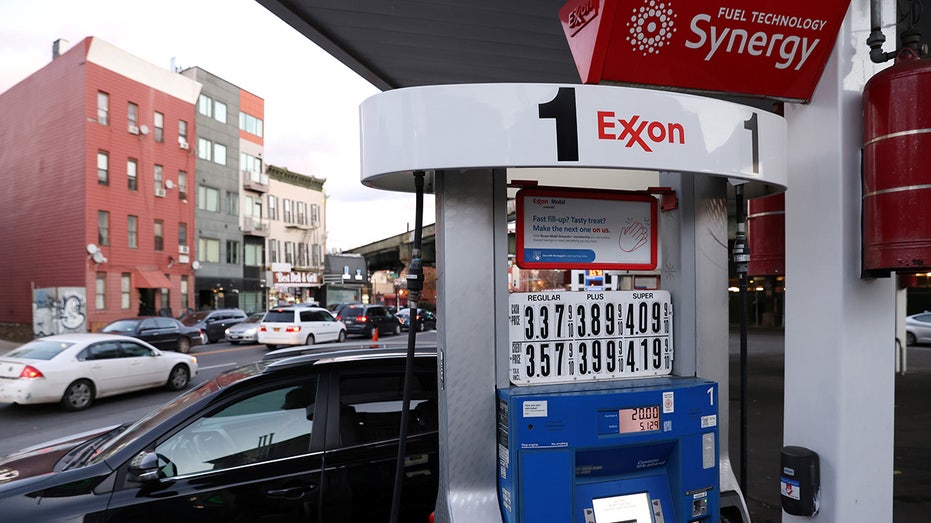Democrats' gas tax suspension could worsen inflation, cost $20B, analysis shows
Suspending the federal gas tax could lead to higher inflation in 2023
Natural gas prices could escalate amid Russia-Ukraine tension
FOX Business' Lydia Hu explores the impact of rising gas prices as EQT CEO Toby Rice argues the solution is more infrastructure.
A proposal from some Senate Democrats to temporarily pause the federal gas tax in order to help combat the pain of surging prices at the pump could actually exacerbate inflation, according to a new analysis.
The Gas Prices Relief Act, introduced last week by a group of vulnerable Democrats, including Sens. Mark Kelly of Arizona and Maggie Hassan of New Hampshire, would eliminate the federal gas tax of 18.4 cents per gallon until the end of the year. It's intended to help consumers cope with high gas prices and is part of a broader plan to combat rising prices nationwide.
BIDEN ADMINISTRATION STOKING HIGHER ENERGY PRICES WITH OIL, GAS CRACKDOWN: ANALYSIS
A gallon of gas, on average, cost $3.51 nationwide on Wednesday, according to AAA – up from $2.51 a year ago. In California, gas prices are well over $4 per gallon. Prices are expected to climb higher as the country enters peak travel season and as heightened tensions between Russia and Ukraine threaten to further rattle the market.

Signage is seen on a gasoline pump at an Exxon gas station in Brooklyn, New York City, Nov. 23, 2021. (Reuters)
But the Committee for a Responsible Federal Budget (CRFB) argued that suspending the tax for the remainder of the year could lead to higher inflation rates in 2023 by increasing demand for gasoline and other goods and services when the economy is already confronting high consumer demand and pandemic-induced supply chain disruptions.
"While the gas tax holiday may reduce prices at the pump, it will further increase demand for gasoline and other goods and services at a time when the economy has little capacity to absorb it," the blog post said. "The result could be even higher rates of inflation in 2023."
Suspending the gas tax between March 1 and Dec. 31 would also reduce revenue by about $20 billion, according to the CRFB.
A separate analysis from the non-partisan Joint Economic Committee, however, suggests the pricetag is closer to $15 billion.
Money from the tax is used to pay for the Highway Trust Fund, which covers expenses like highway construction and public transit. More than $42 billion is expected to flow into the Highway Trust Fund this year – more than three-fifths of which stems from the gas tax, according to the CRFB. A tax holiday would "significantly decrease" that revenue.
The bill would require the Treasury Department to deposit general funds into the trust fund to make up for the lost tax revenue and to ensure the fund remains solvent. It could require further borrowing. The bill also directs the Treasury Department to monitor the program in order to ensure that oil and gas companies pass along the savings to consumers.
"Without the general revenue transfer in this bill, this holiday would advance insolvency of the Highway Trust Fund by a year, from fiscal year 2027 to fiscal year 2026," the CRFB said.

Truckers wait with their truck, at the Marathon Oil Refinery to be loaded with fuel in Salt Lake City, Utah, on Oct. 29, 2021. (GEORGE FREY/AFP via Getty Images / Getty Images)
For months, the prices of all kinds of energy – gasoline, diesel fuel, natural gas, oil and more – have been a major driver behind inflation, which surged 7% in December, the highest level since 1982. Energy costs have climbed more than 29% over the past year, in part due to lopsided supply and demand. Consumers are traveling more, but the supply side has not kept up with the demand.
GET FOX BUSINESS ON THE GO BY CLICKING HERE
The rising prices are eating away at the strong wage gains Americans saw last year and are hitting the lowest-income households the hardest. An analysis from the University of Pennsylvania's Penn Wharton Budget Model shows that higher energy prices cost the average American an additional $1,200 last year. The lowest-income households spent about 11% of total expenditures on energy in 2021, up from 8% in 2020.





















